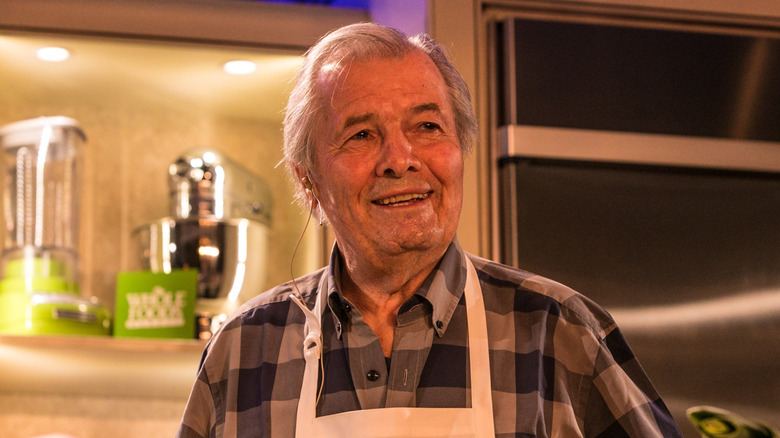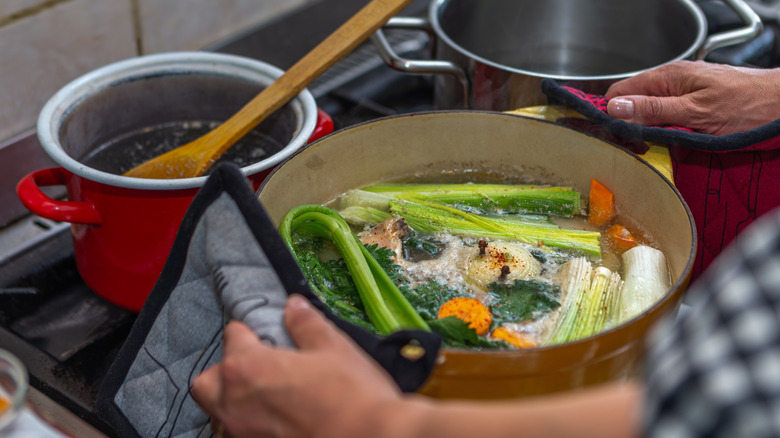One Of Jacques Pépin's Most Enduring Tips For Home Cooks Is Especially Relevant Today
There is not perhaps a more renowned home cook than Jacques Pépin. His career began early, helping in his parents' restaurant, Le Pélican, before working in many fine restaurants, even serving as personal chef for several French heads of state. But, in addition to these extensive restaurant industry laurels, he also penned more than 30 cookbooks, sharing his wealth of culinary knowledge with home cooks around the world. Many of his lessons are just as poignant now as they were when he first learned them all those decades ago. One mantra that weaves its way into all of his work is this: all cooks should be frugal cooks — with time, effort, and ingredients (read: money). He even wrote an entire book about economical cooking called "Cooking My Way."
Pépin was born in France in 1935 and grew up under Nazi occupation. This was a time of enormous food scarcity throughout the country, and he credits this as the formative reason for what he often refers to as his "miserly" cooking style. He learned from watching his mother cook with whatever was available, making use of every bit. But his father, too, was not flippant about food waste. He recalled in a Facebook cooking video how his father would never throw away even a small piece of stale bread. If he had to — if it was moldy, for example — it would go to the chickens. Pépin has many tips for home cooks, and his lessons on frugality are as relevant as ever, with grocery prices always on the rise.
How to be more frugal in your home kitchen
These days, food scarcity is not an issue in most kitchens the way it was for Pépin growing up, but that doesn't mean that it doesn't pay to be smart about how you shop and cook. A move that serves both your pocketbook and the quality of your meals, cooking with the season is an oft-repeated Pépin suggestion. Choosing to buy and use whatever vegetables are in season at the moment not only ensures that you are getting the freshest, most delicious produce available, but it is also often the cheapest way to shop. Cooking up this super springy vegetable soup, with ingredients like asparagus and peas, will be a lot cheaper (and tastier) in May than it will be in December.
Another area of frugal cooking that Pépin returns to again and again is making sure that you use every bit of every ingredient. In times of surplus, it is easy to discard the scraps when cooking, but this renowned chef is someone who knows what scarcity can really mean. Throughout his books and television shows, Pépin reduces food waste through creative uses for even the smallest crumbs that you might not have thought there was any use for. Stale bread becomes croutons, which, in turn, become breadcrumbs. Vegetable scraps are made into delicious stocks and soups. He even has a use for the little bits of cheese you might find lost in the back of the fridge.
How cooking from scratch saves money and improves health
Soup is a favorite waste-reducing recipe for Jacques Pépin. On his show "Cooking at Home," Pépin demonstrated the method of whipping up a quick soup with the leftover scraps from the recipes he had cooked in the preceding days. The "Fridge Soup," as his wife named it, that he cooked in this episode was made with scraps like damaged potatoes, extra mushrooms, carrot bits, and leftover chicken skin from another recipe. The ingredients seem like a motley bunch at first, but that is the beauty of soup. In the end, it makes a lovely meal.
Another unique Pépin recipe that makes use of something that might otherwise end up in the trash is his fromage fort. In this recipe, Pépin uses leftover bits of various old cheeses (such as mimolette, Swiss, camembert, or whatever he has on hand), trims the mold off, and sticks them in the food processor with garlic, white wine, broth, pepper, and sometimes cream cheese or sour cream to create a smooth, spreadable cheese. In a Facebook video explaining the recipe, he suggests putting this fromage fort on soup or pasta, in gratin or cream puffs, or simply spreading it on toasted bread. The best part? The recipe will never taste the same twice.
Frugal cooking often involves spending a bit more time in the kitchen to extract the best out of every ingredient and scrap, but the mentality of slow living and slow food is something we could all probably use a bit more of right now.


